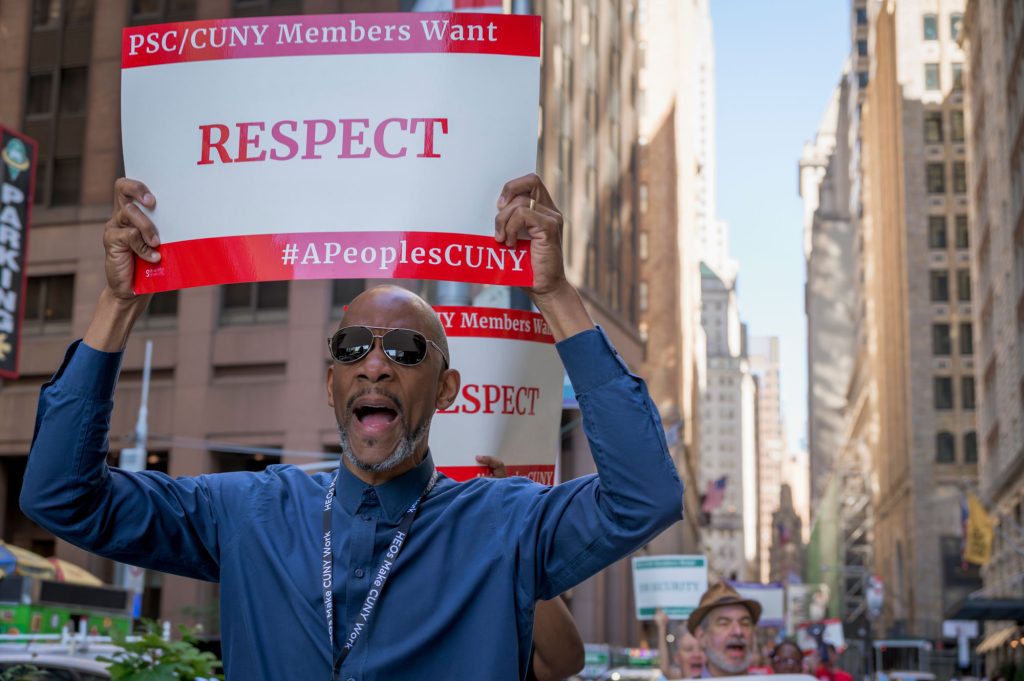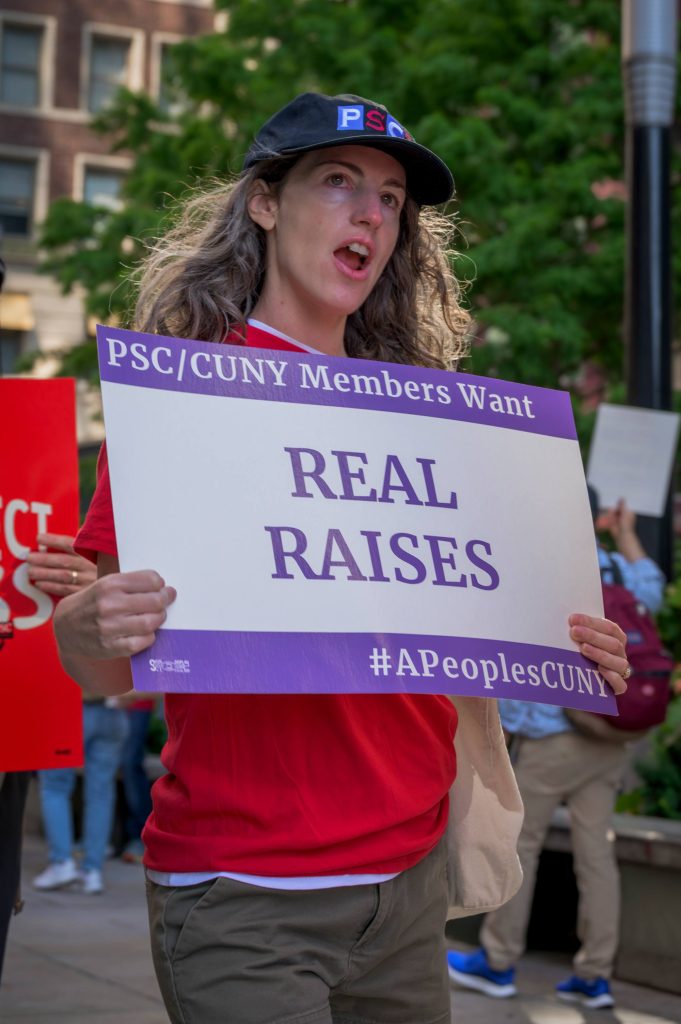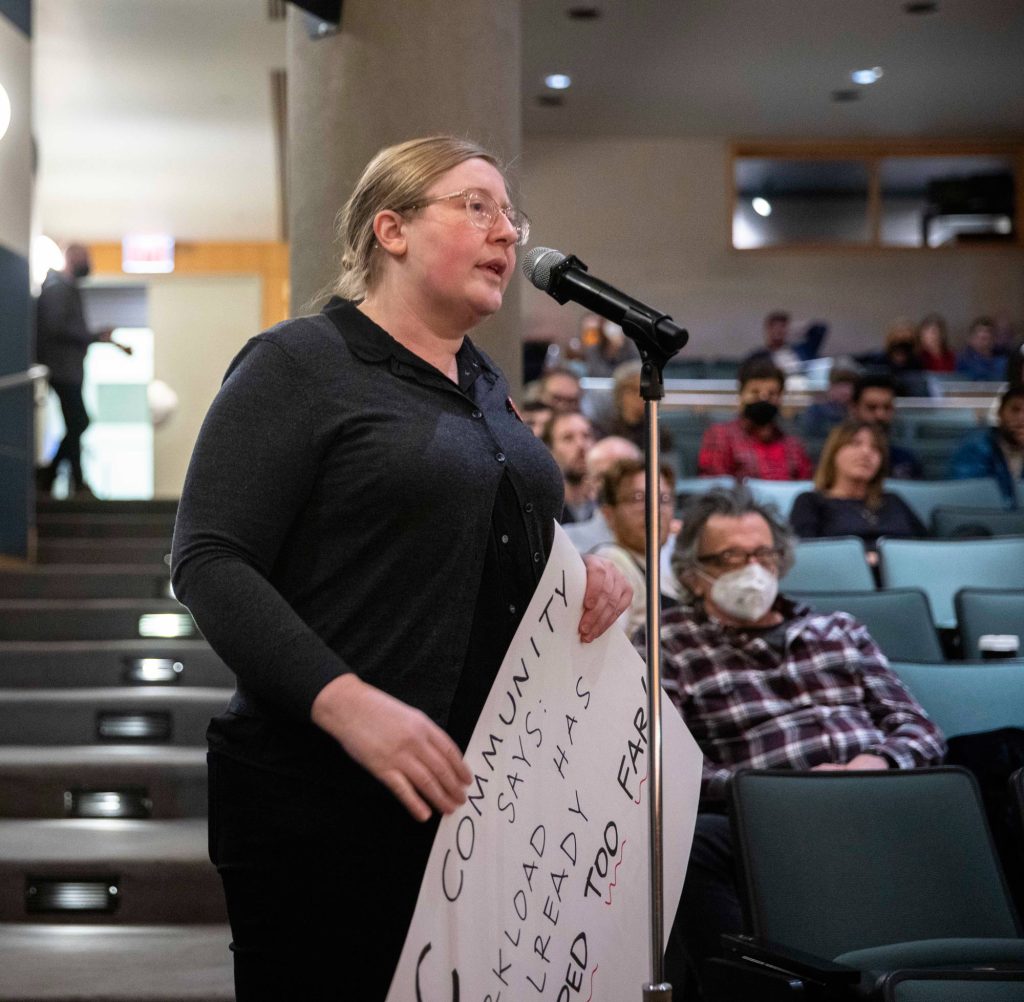A recent PSC survey highlighted in the June issue of Clarion showed that CUNY professional staff – higher education officers, college laboratory technicians and library faculty – are facing increasing workloads thanks to staff shortages. The PSC plans to use these findings at the bargaining table to better working conditions, job protections and pay.
“It confirms what we already know,” said Janet Winter, the co-chair of the union’s HEO chapter, who added that HEOs and other professional staff were demanding fair raises and remote work options.
MORE WORK

Jeffrey Sigler says respect starts with more pay.
(Credit: Erik McGregor)
Clarion reported that the survey found that “52% of members in non-instructional titles said their workload has ‘increased significantly’ over the last four years, while 33% said that their workloads had ‘increased somewhat’” and that “only 2% reported that workloads had ‘decreased somewhat’ and no one said workloads had ‘decreased significantly.’” Clarion said that a “whopping 71% of those surveyed reported ‘understaffing’ was the source of the increase, while 51% said that the nature of the work had changed.”
Liz Stevenson, an ASAP advisor at City Tech, said that demands for contractual language for remote work options were important because professional staff have shown over the years that they can do their jobs just as well, and sometimes better, with hybrid work schedules as they did during the pandemic. Such schedules allow for staff to “live much fuller lives.”
CUNY bosses are following the lead of most other bosses, resisting worker demands for hybrid schedules because they have a Taylorist desire to exert as much control over their workers as possible.
The union has been able to win protections for remote work since the agreement was first put in place in 2020. And recently, the PSC secured a deal with CUNY to extend the current remote work agreement through June 30, 2025, while negotiations continue about the future of remote work. The extended agreement provides a framework for arrangements between workers and their supervisors about the schedule and duration of remote work, and guarantees contractual protections when working remotely.

Liz Stevenson says staff need hybrid work options.
(Credit: Erik McGregor)
HYBRID OPTIONS
Stevenson added that she was pushing for remote work because working conditions for CUNY professional staff are often so bad. “It’s unsafe, it’s unhealthy,” she said.
She often walks into an office where the heating and air conditioning don’t work. The union has documented mold at many campuses and workers complain of windows that fail to open. Stevenson said that HEOs and other staff deserve better working conditions on their campuses. Without safe working conditions, she and her colleagues were owed the ability to work remotely, Stevenson said.
John Gallagher, a director of organization and business effectiveness for IT at Borough of Manhattan Community College, said, “HEO staff have been taking on excessive extra work to make up for [vacated] positions that were never filled. They also have been extending their hours when working remotely to make sure students don’t fall through the cracks. COVID made our jobs more difficult, but we’ve met the challenges head on. It’s fortunate that we have a union that listens to us and makes sure management knows our struggles.”
LOW STAFFING
Alycia Sellie, the chair of the union’s library committee, said, “Overall, staffing is as low or perhaps lower than it has ever been in CUNY libraries. Across CUNY, everyone is being asked to do more and more and more with fewer staff. Junior faculty especially have been tasked with filling in when someone leaves or retires and a line cannot be replaced.”
She noted, “Some libraries cut hours at the last minute due to shortages, and some of these cuts overlap with the cuts to public library hours, which leaves our researchers with little space or alternatives. Some libraries were so short on staff that their management contemplated opening the space but cutting what some of us consider essential services – i.e. open the library for spring break, but have no circulation desk staff who could help patrons check out books. It has been a very hard year.”
Sellie, a collection development librarian at the Graduate Center, explained that this has left members in her committee defeated, with some giving up on CUNY altogether. “Dedicated and hardworking librarians have left CUNY because their plates were overloaded with work,” she said. “Others have struggled in being assigned new tasks or reassigned to wholly new duties.

Alycia Sellie advocates for library faculty.
(Credit: Dave Sanders)
Junior faculty are struggling to juggle increasing daily workloads alongside their responsibility to their scholarship, which will keep them in their jobs. Many people have taken on tasks in different areas of the library that have little overlap, stretching all of us far across our capabilities.”
NEED RESPECT
Jeffrey Sigler, the director of enrollment management and student services at Medgar Evers College, hoped that the survey results “bring attention to our cause.” For Sigler, professional staff are too often an afterthought in the conversation about CUNY, even though it is advisors, counselors, library faculty and CLTs who are often directly working with students. More than anything else, Sigler believed that the survey supported the demand for higher pay.
“Respect and real raises,” he said. “People have jobs for a reason.”
The push for justice for professional staff is occurring as PSC organizers are traveling around the city to meet more professional staff members and sign up new members. “The more of us whom we engage, the better,” Winter said.
Published: August 5, 2024

